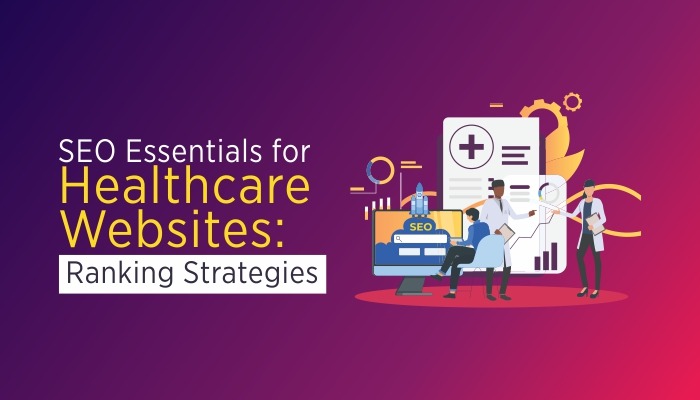
SEO Essentials for Healthcare Websites: Ranking Strategies
According to the Global Wellness Institute, the worldwide wellness economy had an estimated value of $4.9 trillion in 2019 but experienced a decline to $4.5 trillion in 2020 due to the significant economic impact of the COVID-19 pandemic. However, it rapidly bounced back from this setback. By 2022, the global wellness economy had surged to $5.6 trillion, marking a nearly 14% increase compared to its size in 2019.
GWI anticipates a resurgence in the wellness economy. Projections indicate an average annual growth rate of 8.6%, with the wellness sector expected to reach $8.5 trillion by 2027. Notably, in 2022, the wellness economy constituted 5.6% of the global economic output.
Therefore, healthcare companies and wellness brands need to engage with solid fundamentals to expand in the market. The content present on your website is more likely to undergo rigorous evaluation by Google’s Search Quality Raters. The purpose is to ensure that the information provided is not only helpful and factually accurate but also won’t potentially cause harm to readers.
Why SEO is important for Healthcare Websites?
In today’s digital age, having a strong online presence is pivotal for healthcare organizations. SEO isn’t just a tool for climbing the ranks in search results; it’s about ensuring that people can easily find accurate medical information and services when they need them most. When healthcare websites rank higher in search engine results, it boosts credibility and trust among patients. It’s like creating a digital signpost that guides individuals to reliable healthcare resources.
Moreover, well-executed SEO strategies don’t just benefit the websites; they also offer a competitive edge to healthcare providers, drawing in a wider audience and making crucial medical resources more accessible. Ultimately, a healthcare website optimized for search engines isn’t just about traffic numbers; it’s about becoming a dependable hub for medical information and services in today’s online world.
What factors affect the Search Engine Optimization Ranking?
Yes, it’s all about the content! Good content is most important because it’s what people are looking for. Websites with helpful, interesting, and well-written stuff tend to show up higher in search results. Let’s see other factors now:
Unique yet most searched Keyword
Placing special keywords in your content, which is in trend helps boost user’s search. It can include titles and descriptions to help search engines understand what the website is all about.
Building Trust and Credibility
High search engine rankings signify authority and credibility. Patients often associate top search results with reliability, assuming these sites offer trustworthy information or services.
Better Patient Engagement
SEO doesn’t merely focus on higher rankings; it also centers on providing a seamless user experience. Optimized websites with relevant content, easy navigation, and quick loading times encourage users to spend more time engaging with the site. Improved user experience positively impacts patient engagement and satisfaction.
Staying Competitive
The healthcare industry is highly competitive. With numerous providers vying for patients’ attention, implementing strong SEO strategies becomes imperative to stand out. Websites that rank higher in search results gain a competitive edge, attracting more patients and retaining existing ones.
Local Search Optimization
For healthcare practices catering to local communities, local SEO tactics are crucial. Optimizing for local searches ensures that the website appears in local listings, making it easier for patients in the vicinity to find and choose their services.
SEO- Stepping Stone to build Brand Image
The brand image represents consumers’ perceptions of a brand, especially in the demanding healthcare sector where a single negative comment can swiftly impact a brand’s reputation. Healthcare services, oriented towards societal welfare, require careful handling and thoughtful responses to maintain credibility. The brand image encapsulates people’s sentiments, experiences, and beliefs tied to a brand. Healthcare marketing endeavors focus on nurturing a positive brand image, establishing emotional connections with patients, distinguishing from competitors, and creating a lasting identity. This favorable impression not only draws new patients but also fosters their loyalty, pivotal for sustained brand growth.
In today’s tech-driven landscape, SEO plays a significant role in societal service. Consistent creation of high-quality content and effective link-building efforts bolsters credibility, fostering trust and positioning the brand as a reliable industry source. Integration with social media platforms augments SEO, amplifying brand visibility and enhancing engagement. Through uniform brand messaging across online platforms and utilizing analytics for insights, SEO not only boosts search visibility but also shapes enduring brand identity, cultivating a robust and enduring brand image in the digital realm.
Steps to Boost Your Medical Practice Website with SEO
1. Highlight What You Offer
Pinpoint the main medical services you provide. This helps to organize your website better and plan your keyword searches.
2. Find the Right Keywords
Collect keywords related to each service area. This builds a content plan focused on what your practice specializes in.
3. Group Keywords Together
Group similar keywords to understand which ones matter most for your content. This helps decide which keywords to use.
4. Sort Your Content Plan
Organize your keywords by what’s most important. This creates a plan to focus on the vital stuff.
5. Make Content Creation Simple
Set up easy outlines for your content, follow a step-by-step process, and use platforms like Outranking to make creating content straightforward.
6. Make Your Content Search-Friendly
Create and adjust service pages, web content, and blogs to attract people using search engines. Tools like SEO checkers can help.
7. Strengthen Links Inside Your Site
Use pages that already rank well to boost other pages. This helps your important pages rank better.
8. Get Noticed Locally
Secure mentions and links from local places that people trust. This helps your site appear more often in local searches.
9. Make Your Site Faster and User-Friendly
Speed up your website, make content easy to read, and ensure it looks good on phones. Tools like Nitropack and Codecanyon can help with this.
10. Keep an Eye on Your Rankings
Check how well your pages are doing on Google. Improve the ones that aren’t doing well and find new ideas for content.
11. Get the Most out of Google Business
Fill out your Google Business Profile with accurate info, good reviews, and keywords that fit your local area. This helps people find your practice easily.
12. Turn Visitors into Patients
Focus on getting people to become patients, not just visitors. It’s about quality, not just quantity, of people coming to your site.
Selecting the Best SEO Agency for Your Medical Practice
Expertise Check
Opt for an agency with strong SEO expertise, particularly in the healthcare sector. They should develop strategies aligning with your objectives.
Review Their Track Record
Examine feedback from other healthcare clients. Look into their reviews, case studies, and testimonials to gauge their past performance.
Unique Approaches
Choose agencies offering innovative and distinctive strategies & tools to stand out among competitors. This would help you keep up with the market.
In essence, having a robust SEO plan for your medical practice can be a game-changer, attracting more patients and fostering online growth. Partnering with professionals like BHAAV can ensure a seamless process, customized exclusively for your medical services.
